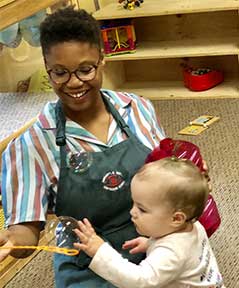 Respect is at the heart of the Montessori classroom. The ideas of grace and courtesy prevail in this educational setting. How can you help your child learn about respect? Take a look at the top tips to help your child learn about this quality in a patient, tolerant way.
Respect is at the heart of the Montessori classroom. The ideas of grace and courtesy prevail in this educational setting. How can you help your child learn about respect? Take a look at the top tips to help your child learn about this quality in a patient, tolerant way.
Model Respect
You can’t expect your child to show (or even understand) respect if you don’t lead by example. Montessori educators respect their students. They also expect the students will give the same respect back — both to adults and their peers.
How can you role model respect for your child? Some of the easiest ways to do so include:
- Remain attentive when they speak. Your child’s thoughts and words are important. Give your child the respect they deserve and pay full attention when they speak. While this isn’t always easy, it demonstrates the connection between undivided attention and respect for others.
- Use kind and courteous words. Please and thank you are simple signs of respect. Use these words often with your child as you role model positive behavior.
- Treat others with kindness and courtesy. Show your child what respect looks like in action. Greet friends and family with a kind word, use pleasantries like please often, and speak kindly of others even when they aren’t around.
These seemingly simple actions set a serious tone for your child. The more respect you show toward others, the more likely it is that your child will follow your courteous and kind actions at home, at school, or anywhere else they go.
Create a Caring Community
Even though you’re a prime figure in your child’s life, you aren’t the only other human they interact with regularly. The Montessori classroom is a caring community, where everyone is respected as an individual.
Expand the caring community from the classroom and into the rest of your child’s world. To create this type of environment:
- Make your child feel safe. Whether they’re at home, at grandma’s, or at a neighbor’s, make sure your child feels safe, loved, and respected. Supervision and kind words can go a long way to create this type of caring community almost anywhere.
- Value other people’s opinions. The ability to identify, accept, and value what someone else feels is part of respect. Create an environment at home (and elsewhere) that’s free from bias or stereotypes.
- Use courteous and caring language. Again, please and thank you are easy ways to show respect. Extend the use of respectful language to your home, the playground, or other places your family visits regularly.
A safe environment that places value on the individual can help your child to feel respect and give it back to everyone around them. Read on for more information on how to reinforce respectful behaviors and help your child to develop as a courteous and kind person.
Praise the Effort
The young child won’t always find respect an easy concept to grasp — or display. While your child may have the best intentions, sometimes immature social, emotional, or cognitive development gets in the way. This can make it difficult to show complete courtesy and kindness in every situation.
As your child explores the idea of respect and attempts to show this behavior:
- Focus on their actions. Does your child take turns or share? Even if they don’t remember to say please or thank you, praise the part of the action that shows courtesy and kindness.
- Give partial credit. Did your child make an attempt to act with respect? Did the effort only partially succeed? Praise the positive parts of their actions and discuss why the attempt wasn’t entirely successful.
- Speak in specifics. A steady stream of “great,” “good job,” and “nice” may not mean much to your young child. Instead of general terms, praise specific areas of effort.
Not only will praise make your child feel better about their actions, but it can also guide them toward positive behaviors. The more feedback they hear, the better they’ll understand what is and isn’t acceptable behavior.
Is your child ready to start a new learning journey? Contact Miniapple International Montessori Schools for more information.

